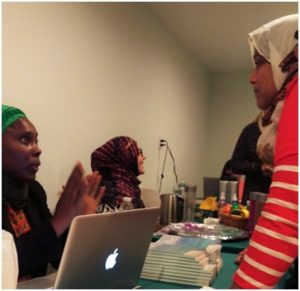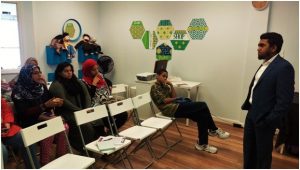HICKSVILLE, NY – Addressing taboo issues in the Muslim community, Mubarakville, an Islamic art gallery and lifestyle store, hosted a full-day health fair earlier last week, offering a full-day events with workshops on nutrition, charity, anger and addiction, essential oils, and kids martial art.
“We hope to put an emphasis on certain topics that are affecting our community but unfortunately may not be discussed as openly.” Mubarakville creative director, Sarwat Jafri, told AboutIslam.net.
“A lot of times, people are hesitant to seek professional help or go to certain institutions because they are not as culturally sensitive. We had a Muslim counselor come and talk to kids [about sexual abuse] in a way that Muslim parents felt comfortable.”
Mubarakville, a Muslim gallery and “lifestyle store” that supports Muslim artisans, sponsored the health fair, which was held last Sunday, August 28.
Addressing various social issues affecting American Muslim communities, the fair is the most recent event hosted by the establishment.
Previously, the organization hosted events on anti-bullying, divorced mothers, as well as adoption and foster care.
During the event, Mubarakville encouraged visitors to concentrate on their mental and emotional wellbeing and to learn about various preventative healthcare measures that may increase longevity and improve quality of life.
Citing an incident of sexual abuse of a Muslim girl at an Islamic school, Jafri noted the lack of platforms for these issues in traditional Muslim spaces.
“There are all these issues that, unfortunately, masjids are often not really tackling, that Islamic schools are not really tackling, and a lot of people who try to raise awareness in those forums encounter a lot of red tape. Here, they can come and discuss” she added.
Jafri added that they developed the health fair to focus on “healthy lifestyles, especially on mental health because we noticed that in a lot of Islamic households, mental health and getting therapy are taboo.”
Mental Health

Tope Ganiyah Fajingbesi (left) talking to a health fair visitor
During the health fair, workshops helped participants to develop an appreciation for the links between faith, spirituality and mental health.
During the “Seeking Clarity, Direction, and Permission to Live” workshop, author Tope Ganiyah Fajingbesi encouraged Muslims to take time out of their busy schedules to be actively still and become more receptive to the messages Allah is sending.
“Go away from your natural elements,” Fajingbesi advised, as she gave examples from the Quran of the People of the Cave, Zakariyyah, Maryam, and Prophet Muhammad who all removed themselves from their people to places of seclusion and the miraculous things that occurred.
“Allah talks about the importance of being still,” explained Fajingbesi, “about praying in the dead of night while everyone else is sleeping. We need to take the time out.”
Licensed therapist Bisma Anwar offered tips on mindfulness and stress management, helping visitors create meditative tools to increase their ability to actively focus and mentally decompress.
“I saw a need for it in our community. There is such a stigma for people to even accept that they are going through something and that they might need some help,” Anwar told AboutIslam.net, citing reasons for becoming a mental health professional.
“Therapy is about realizing your own potential. It is realizing that you have the skills, that you have the ability to manage your emotions, to lessen your anxiety and to lessen your depression. It is about understanding what those skills are. That is why you would meet with a therapist, to gain and master those skills.”
Anwar elaborated on the connection between mental/emotional wellbeing and worship.
“It’s not one or the other. Whatever your beliefs are, you use them in the course of therapy. They help you instead of being something completely separate from the process.”
In the “Anger and Addiction” workshop, Oaktree Institute psychotherapist Mohammad Hasan expounded on four misconceptions about mental health and the adverse effects of anger and addiction.
“We (Muslims) feel that mental illnesses are not actual illness. If I have a problem with my pancreas, I don’t have a problem blaming my pancreas, but mental illness means that there is something wrong with what is inside me. To say that the disease itself is inside where you exist as a person, your talents, your gifts, your intellect, who you are as a human being, is hard to accept.”
Preventative Healthcare

Wahed Hasan talking with “Anger and Addiction” workshop attendees.
Tables at the health fair offered free health screenings by East Meadow Medical, P.C. and All Island Neurology.
Dr. Sabeen Razzaq-Ahmed also gave a workshop on preventative healthcare for women.
Razzaq-Ahmed explained to the workshop audience that chronic diseases are “responsible for 7 out of 10 deaths of Americans each year” and “these chronic diseases can be largely preventable through appropriate screenings and treatment.”
Razzaq-Ahmed then explained various health screenings necessary for Muslim women to maintain optimal health, including wellness visits, blood pressure, diabetes, hearing, dental, pap smears, mammograms, STD/HIV, and domestic violence.
Workshop participants then played “Healthcare Jeopardy”, where they answered questions about preventative healthcare.
There were also workshops on nutrition, essential oils and hijama, which is the Sunnah-based tradition of cupping.
